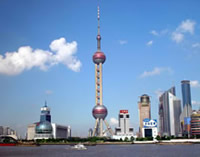Why Expo? Shanghai seeks 70 million answers
2010. 22 April
by Bill Smith
(earthtimes.org)
The Shanghai World Expo 2010 opens next month with a focus on the rapid urbanization that is transforming the lives of hundreds of millions of people across the globe, in few nations as dramatically as China.World Expositions began in the 19th century as celebrations of scientific and artistic creativity, and showcases for the world's finest industrial and cultural products.
Today, we live in an era dominated by television and the internet.
When newly released inventions and products can be seen almost instantly across the globe, some observers are asking whether the time of the giant World Expos is already over. Who remembers the last one?
Yet the six-month Shanghai event will have the highest ever number of exhibits and organizers aiming to attract a record 70 million visitors, most of them Chinese.
For one German adviser working on one of the exhibits, the huge number of anticipated visitors is the best argument for holding the Expo.
Xu Wei, a spokesman for Expo 2010, agrees and sees the event as an opportunity for people in other nations to learn more about China.
"My personal view is that the Shanghai Expo is a good chance for China to show the world that China is a big country, an open-minded country," Xu told the German Press Agency dpa.
Despite the "world culture" theme parks dotted across China and increasing overseas travel by middle-class Chinese, Xu said the chance to experience foreign cultures would be the main attraction for local Expo visitors.
"It gives Chinese people a good chance for a face-to-face experience with different countries," he said.
The Expo is designed to "explore the full potential of urban life in the 21st century," with the theme "Better City, Better Life."
"We hope this Expo can be a dialogue summit about cities, and each pavilion will lay out tradition as well as innovation to the future," Vicente Gonzalez Loscertales, secretary-general of the International Exhibitions Bureau (BIE), told state media.
Since 1928, the Paris-based BIE has approved and supervised Expos "so that they may continue to educate the public and promote innovation in the service of human progress."
The BIE now designates some events as International Expos and others as higher-level World Expos.
Shanghai is the first World Expo since Hannover in 2000, while the 2005 Expo in Japan's Aichi was named an "international" event. Italy's Milan is scheduled to host the next World Expo in 2015.
The first Expo was London's Great Exhibition of Industries of All Nations in 1851. The Shanghai Expo is the first one hosted by a developing nation.
As at previous Expos, only the host nation's China Pavilion will be a permanent structure.
One of the most eye-catching temporary pavilions is Britain's sea-anemone-like Seed Cathedral, shielded by 60,000 transparent rods that waft in the breeze.
Each of China's 31 provinces has built pavilions aimed at attracting business visitors and tourists, while some corporate sponsors, including Coca-Cola Co and General Motors Co, have their own pavilions.
Some 20,000 performances are scheduled, such as the famous Shaolin Temple fighting monks and "Cha," a musical celebration of tea culture.
But in a country where an estimated 200 million people still live in poverty, some have questioned the huge cost of the Shanghai Expo and the accompanying burst of infrastructure building that state media said cost China 170 billion yuan (25 billion dollars) last year alone.
A standard single-entry ticket costs 160 yuan (24 dollars), meaning a Chinese one-child family of three would pay the equivalent of up to two weeks' wages for a typical worker or farmer.
To make sure that no one disrupts the Expo or sneaks in without a ticket, Chinese police are mounting a huge security operation similar to the one they organized for the 2008 Olympic Games in Beijing.
About 72,000 volunteers will work inside the Expo site and 100,000 others will staff hundreds of service centres across Shanghai, aided by nearly two million "civic volunteers."
The ruling Communist Party again wants to show only positive images of China.
City police detained some 6,000 people suspected of street crimes including robbery and prostitution during a 12-day pre-Expo crackdown this month, state media said.
The Hong Kong-based China Human Rights Defenders said Shanghai authorities also sent at least 10 local rights activists to labour camps and detained or placed under house arrest dozens of others to prevent them staging protests during the Expo.
Western enthusiasts seem unperturbed by the heavily controlled experience that Shanghai might offer during the Expo.
"One of the best things about World Expos is how much opportunity they provide for people from around the world to learn about each other and from each other," Jose Villareal the commissioner of the US pavilion, said in a statement to the organizers this week.
"Back in the United States, I have been telling everyone I meet that they have got to come to the Expo - that it will be a historic event that they don't want to miss," Villareal said.
Source: www.earthtimes.org




